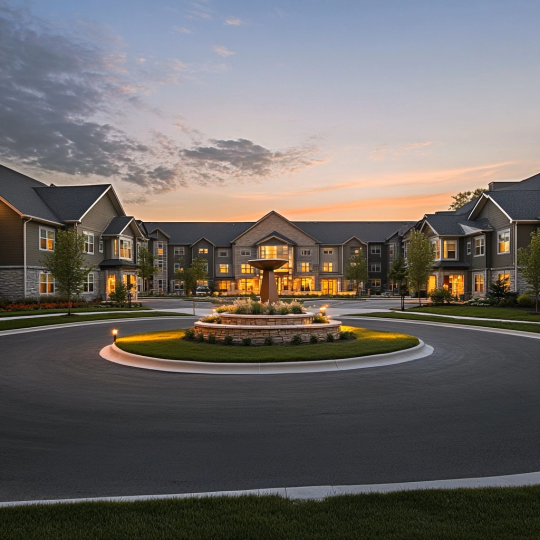TBI Facts
What Is A TBI?
- A TBI, or traumatic brain injury, is trauma that affects how an individual’s brain works. TBIs can be caused by non-invasive means, such as a blow or bump to the head, or by penetrative means, like a gunshot to the head. cdc.gov
-
Why the Long-Term Impact of TBI Is Deeper Than We Realize
While symptoms vary, moderate to severe TBIs often require long-term lifestyle adjustments—not just medical treatment. Survivors may struggle with memory, mood regulation, personality shifts, and loss of independence, affecting both their personal relationships and quality of life. - In January 2025, the Centers for Medicare and Medicaid Services (CMS) officially recognized TBI as a chronic health condition—a critical step that validates the need for lifelong support. This designation further underscores the importance of stable, structured, residential communities for TBI survivors.
Living with a TBI
- For many survivors, life after a TBI means learning how to adapt to a “new normal.” The lasting effects of brain injury—like emotional instability, social withdrawal, depression, and cognitive fatigue—often make independent living difficult.
- Many survivors live with aging parents or family members who serve as caregivers. As parents grow older, a painful question looms: “Who will care for my loved one when I no longer can?” Villa Licci exists to answer that question—with permanent, purpose-filled communities designed for belonging, stability, and care.
- Nearly half of moderate to severe TBI survivors rely on loved ones for daily care. Often, these caregivers are aging parents or single guardians facing burnout and uncertainty about the future. Villa Licci provides a long-term residential solution—creating peace of mind for families, and purpose-filled living for survivors.
Symptoms And Effects
-
What are the long-term side effects of a concussion?
Most sufferers recover within a few weeks. Those with prolonged symptoms may be diagnosed with Post-Concussion Syndrome, which can include loss of focus, memory issues, and sleep disturbances. concussionfoundation.org -
What are the long-term effects of a traumatic brain injury?
Long-term effects can include headaches, seizures, loss of balance, dizziness, sleep problems, reduced cognition, depression, and personality changes. hopenetwork.org -
Can TBI cause mental illness?
Over 1 in 5 TBI survivors will experience mental health conditions like depression or anxiety. Severity depends on the type of trauma and how it was inflicted. nih.gov -
Can a TBI change your personality?
Brain injuries can impact emotional and behavioral responses, leading to mood swings, reduced emotion, or aggression. flintrehab.com -
Social Isolation & Mental Health
People with a history of TBI are 1.5 to 4 times more likely to die by suicide than the general population. Social disconnection, personality changes, and emotional regulation issues often go untreated but significantly affect quality of life. Source: Mackelprang et al., Am J Public Health. 2014.
Types And Diagnosis
-
What are the three types of TBI?
TBIs are categorized as mild (or concussion), moderate, and severe. cdc.gov -
How can you tell if someone has brain damage?
Symptoms may include headaches, nausea, vomiting, fatigue, speech problems, dizziness, blurred vision, confusion, seizures, and pupil dilation. mayoclinic.org -
How long after a head injury can TBI symptoms occur?
Symptoms can appear immediately, within hours, days, or even weeks after the injury. medicalnewstoday.com
Treatment And Recovery
-
Can the brain heal itself?
The brain has neuroplasticity, which allows it to adapt and “re-learn” tasks after a TBI. Repetition and therapeutic exercises are key to recovery. flintrehab.com -
Is TBI permanent?
Not all TBIs have permanent symptoms. Mild TBIs often heal within a few months, while moderate to severe cases may require long-term care. cdc.gov -
What is spasticity?
Spasticity occurs when a muscle remains contracted due to damaged neurons. Symptoms include closed fists and rigid limbs. hopenetwork.org -
Can a TBI get worse over time?
While TBIs can worsen, therapies and exercises can slow degeneration. flintrehab.com
Other TBI Information
- A recent national survey conducted in February 2025 revealed significant gaps in public knowledge about traumatic brain injuries (TBIs).
- 81% of U.S. adults do not recognize concussions as traumatic brain injuries.
- 82% of adults are unaware that falls are the leading cause of brain injuries.
- Only 23% of adults report being screened for brain injury history during medical visits.
- 39% of adults have experienced symptoms of traumatic brain injury in their lifetime.
- Men are nearly twice as likely as women to be asked about brain injury history by healthcare providers.
- 77% of adults recognize that brain injury can develop into a chronic health condition.
- 83% of adults agree there is not enough public awareness about treating brain injury.
- 83% of adults agree there is not enough public awareness about treating brain injury.
The full survey results and key findings are available in the “2025 Public Perceptions of Brain Injury Report” published by BIAA
Need Help?
The Answers to All Your Questions
Just below, we’ve compiled a list of the most common questions about Traumatic Brain Injuries (TBI).







